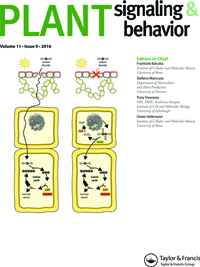 A few months ago, an author alerted us to two retractions — including one in PNAS — after realizing his team had been using plants affected by inadvertent genotyping errors for an entire year. He initially told us these were the only two papers affected, but more recently reached out to say he had to pull a follow-up article, as well.
A few months ago, an author alerted us to two retractions — including one in PNAS — after realizing his team had been using plants affected by inadvertent genotyping errors for an entire year. He initially told us these were the only two papers affected, but more recently reached out to say he had to pull a follow-up article, as well.
Recently, Steven C. Huber contacted us about the newest retraction, noting he was submitting a notice to the editor of Plant Signaling and Behavior:
I’m afraid that I must alert you that we will have an additional retraction, as we just realized that a small ‘follow-up’ article had been published in Plant Signaling & Behavior that highlighted the dual specificity of BRI1 and BAK1 (with the BAK1 reference being the retracted PNAS article). Hence, it is really necessary for us to retract the PS&B article as well. Fortunately we haven’t done more of this, so there shouldn’t be any further retractions coming.
A notice has now been published for “Functional importance of BAK1 tyrosine phosphorylation in vivo:”
We are now cognizant that this paper was reliant on the work of a retracted article published in Proceedings of the National Academy of Sciences of the United States of America: Oh et al. “Autophosphorylation of Tyr-610 in the receptor kinase BAK1 plays a role in brassinosteroid signaling and basal defense gene expression” http://www.pnas.org/content/113/27/E3987.short. The errors that accounted for that article’s retraction significantly compromised the results and conclusions published in “Functional importance of BAK1 tyrosine phosphorylation in vivo.”
The 2011 paper has not been cited, according to Thomson Reuters Web of Science.
Huber, based at University of Illinois, Urbana-Champaign (UIUC), added:
…terribly sorry to have not caught this in the original round of retractions, but we were so focused on the big primary articles that none of the co-authors thought of this paper. However, we feel it is important to be as thorough as possible at this point…
Huber’s proactive attempts to correct the record serve once again as an example of doing the right thing.
Like Retraction Watch? Consider making a tax-deductible contribution to support our growth. You can also follow us on Twitter, like us on Facebook, add us to your RSS reader, sign up on our homepage for an email every time there’s a new post, or subscribe to our daily digest. Click here to review our Comments Policy. For a sneak peek at what we’re working on, click here.